2021-2022学年人教版八年级英语下册Unit 3词汇,短语,语法归纳
文档属性
| 名称 | 2021-2022学年人教版八年级英语下册Unit 3词汇,短语,语法归纳 |
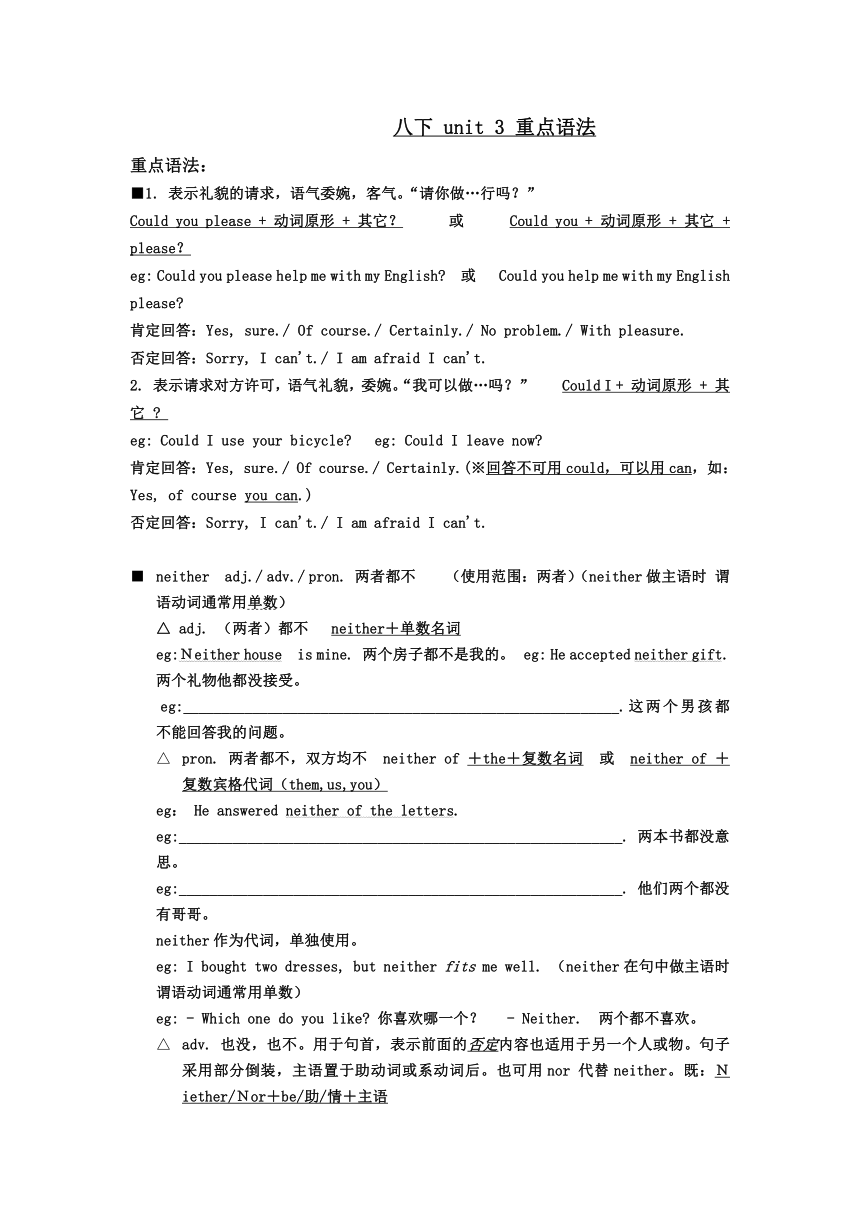
|
|
| 格式 | zip | ||
| 文件大小 | 39.2KB | ||
| 资源类型 | 教案 | ||
| 版本资源 | 人教新目标(Go for it)版 | ||
| 科目 | 英语 | ||
| 更新时间 | 2022-03-27 00:00:00 | ||
图片预览

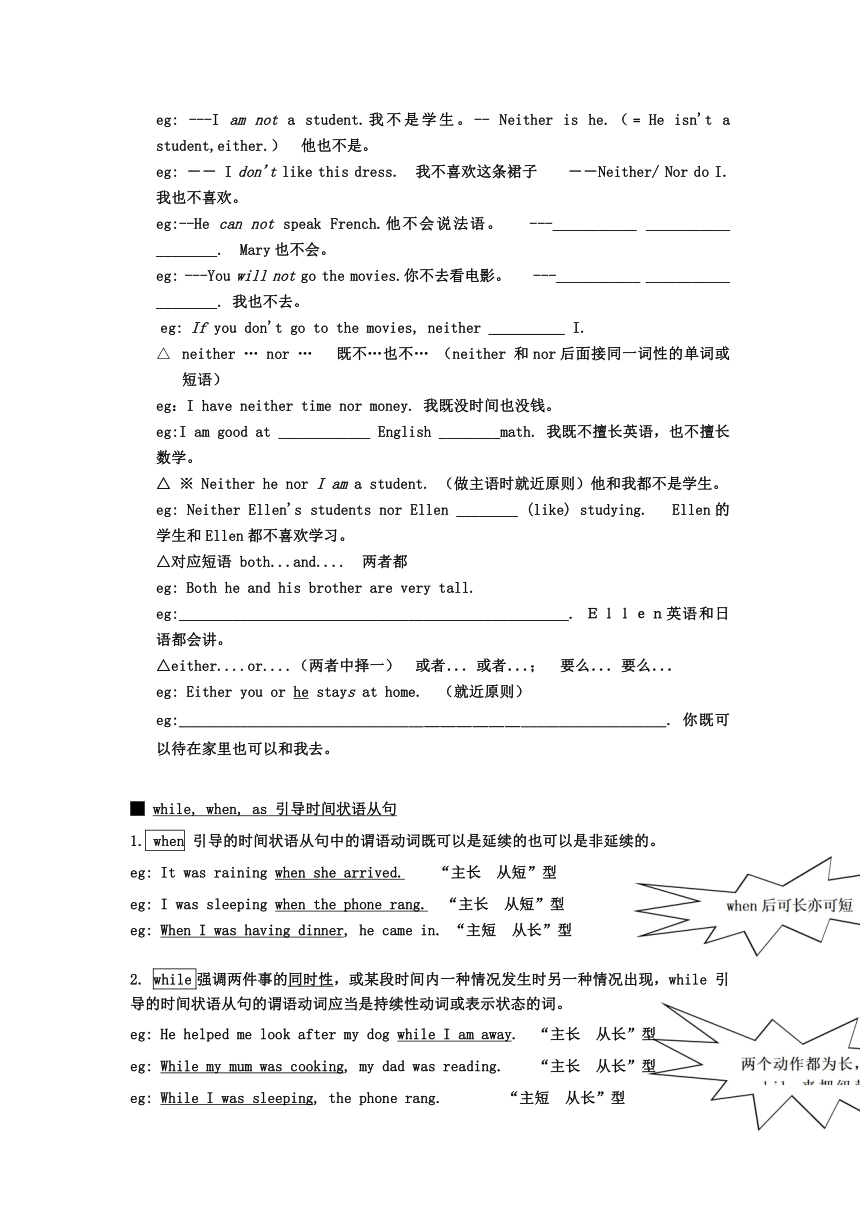
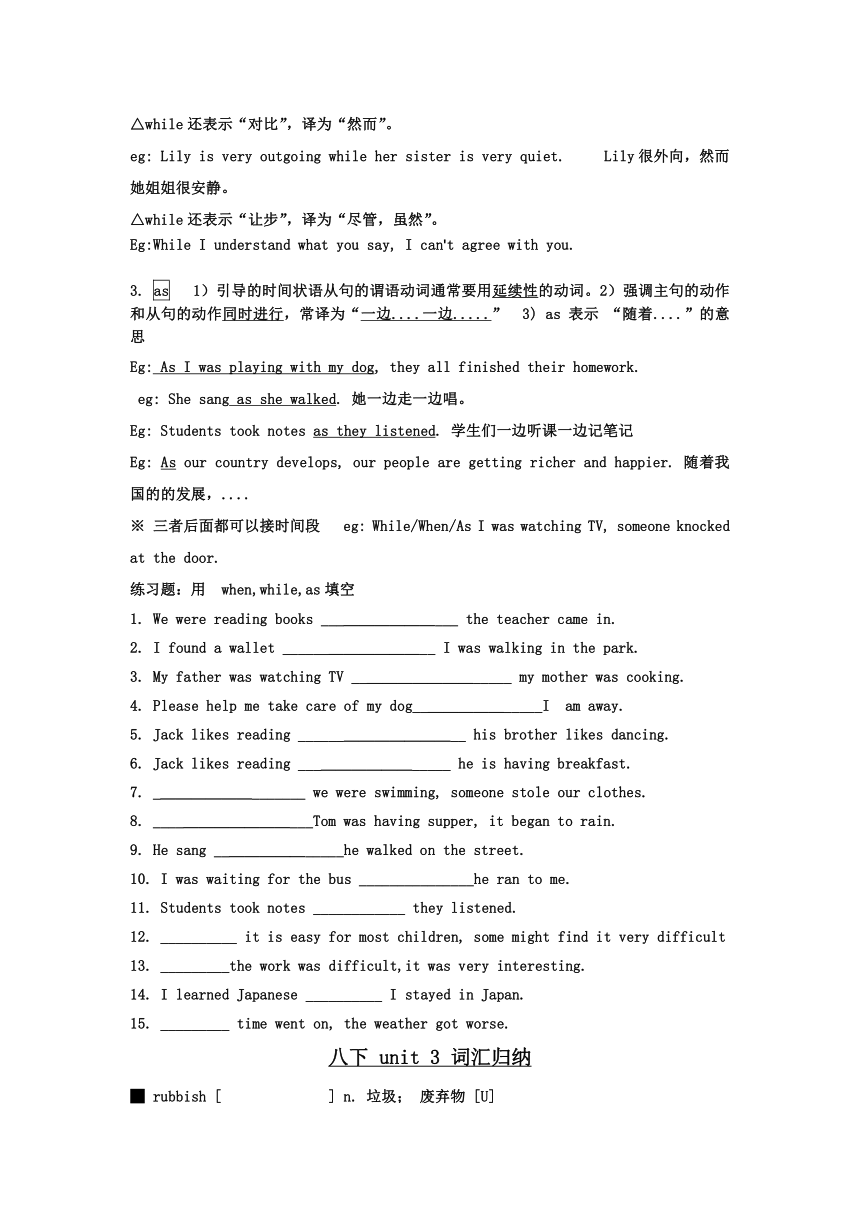
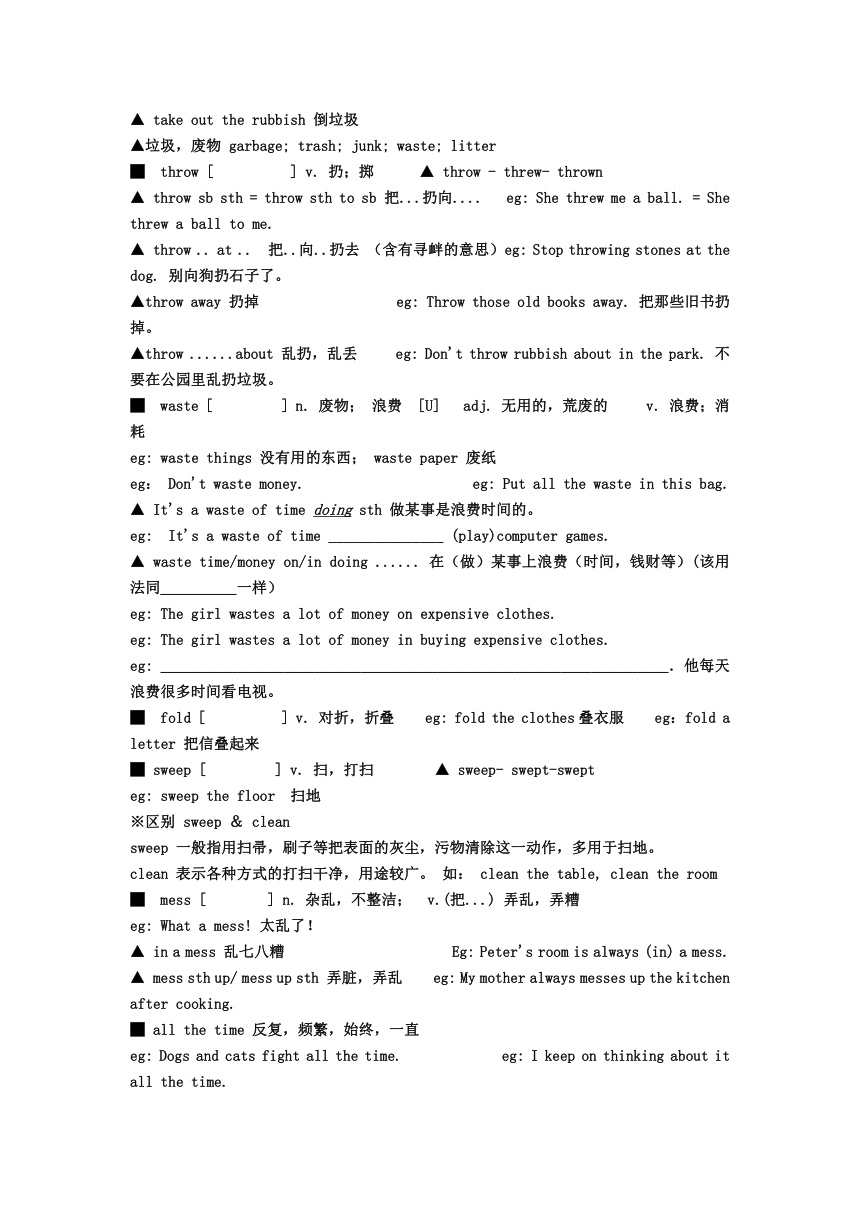
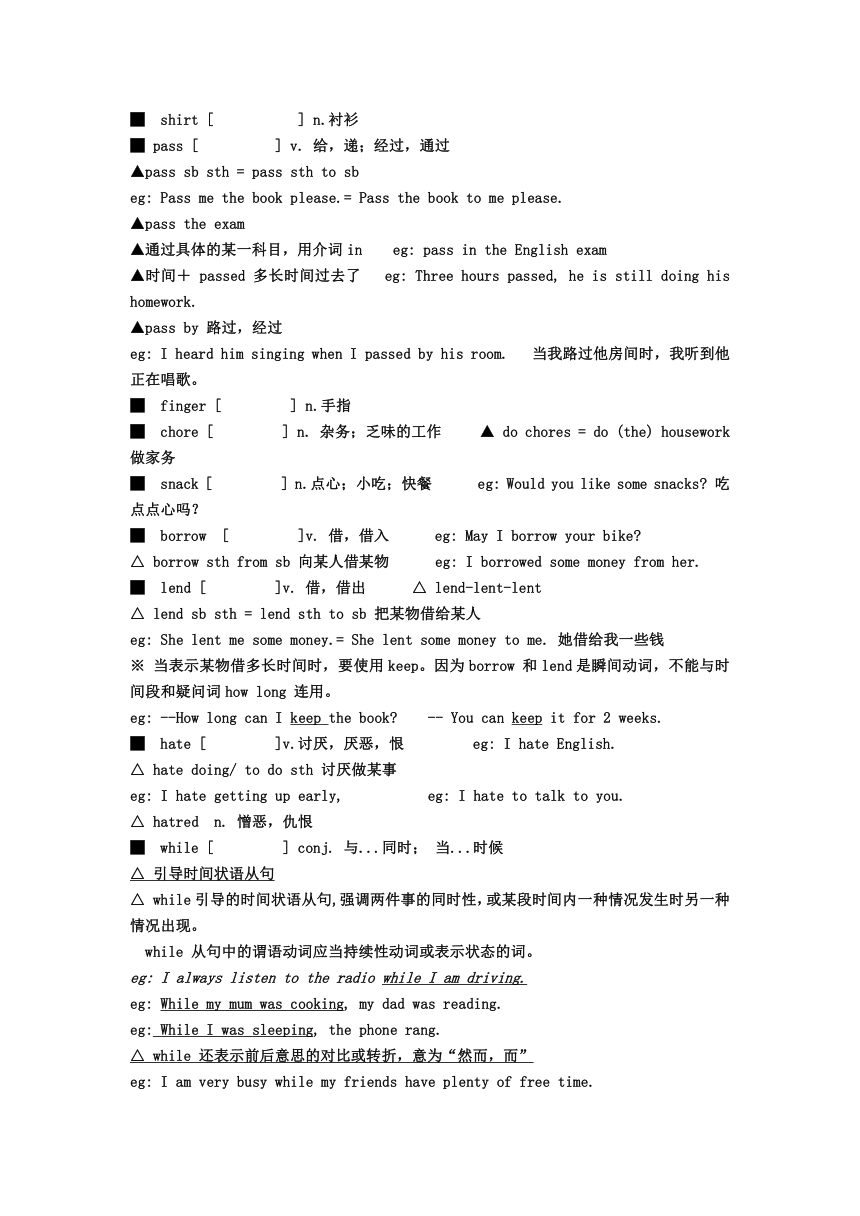
文档简介
八下 unit 3 重点语法
重点语法:
■1. 表示礼貌的请求,语气委婉,客气。“请你做…行吗?”
Could you please + 动词原形 + 其它? 或 Could you + 动词原形 + 其它 + please?
eg: Could you please help me with my English 或 Could you help me with my English please
肯定回答:Yes, sure./ Of course./ Certainly./ No problem./ With pleasure.
否定回答:Sorry, I can't./ I am afraid I can't.
2. 表示请求对方许可,语气礼貌,委婉。“我可以做…吗?” Could I + 动词原形 + 其它
eg: Could I use your bicycle eg: Could I leave now
肯定回答:Yes, sure./ Of course./ Certainly.(※回答不可用could,可以用can,如: Yes, of course you can.)
否定回答:Sorry, I can't./ I am afraid I can't.
neither adj./ adv./ pron. 两者都不 (使用范围:两者)(neither做主语时 谓语动词通常用单数)
△ adj. (两者)都不 neither+单数名词
eg:Neither house is mine. 两个房子都不是我的。 eg: He accepted neither gift.两个礼物他都没接受。
eg:_________________________________________________________.这两个男孩都不能回答我的问题。
pron. 两者都不,双方均不 neither of +the+复数名词 或 neither of +复数宾格代词(them,us,you)
eg: He answered neither of the letters.
eg:__________________________________________________________. 两本书都没意思。
eg:__________________________________________________________. 他们两个都没有哥哥。
neither作为代词,单独使用。
eg: I bought two dresses, but neither fits me well. (neither在句中做主语时谓语动词通常用单数)
eg: - Which one do you like 你喜欢哪一个? - Neither. 两个都不喜欢。
adv. 也没,也不。用于句首,表示前面的否定内容也适用于另一个人或物。句子采用部分倒装,主语置于助动词或系动词后。也可用nor 代替neither。既:Niether/Nor+be/助/情+主语
eg: ---I am not a student.我不是学生。-- Neither is he.(﹦He isn't a student,either.) 他也不是。
eg: -- I don't like this dress. 我不喜欢这条裙子 --Neither/ Nor do I. 我也不喜欢。
eg:--He can not speak French.他不会说法语。 ---___________ ___________ ________. Mary也不会。
eg: ---You will not go the movies.你不去看电影。 ---___________ ___________ ________. 我也不去。
eg: If you don't go to the movies, neither _____ I.
neither … nor … 既不…也不… (neither 和nor后面接同一词性的单词或短语)
eg:I have neither time nor money. 我既没时间也没钱。
eg:I am good at ____________ English ________math. 我既不擅长英语,也不擅长数学。
△ ※ Neither he nor I am a student. (做主语时就近原则)他和我都不是学生。
eg: Neither Ellen's students nor Ellen ________ (like) studying. Ellen的学生和Ellen都不喜欢学习。
△对应短语 both...and.... 两者都
eg: Both he and his brother are very tall.
eg:___________________________________________________. Ellen英语和日语都会讲。
△either....or....(两者中择一) 或者...或者...; 要么...要么...
eg: Either you or he stays at home. (就近原则)
eg:_________________________________________________________. 你既可以待在家里也可以和我去。
█ while, when, as 引导时间状语从句
1. when 引导的时间状语从句中的谓语动词既可以是延续的也可以是非延续的。
eg: It was raining when she arrived. “主长 从短”型
eg: I was sleeping when the phone rang. “主长 从短”型
eg: When I was having dinner, he came in. “主短 从长”型
2. while强调两件事的同时性,或某段时间内一种情况发生时另一种情况出现,while 引导的时间状语从句的谓语动词应当是持续性动词或表示状态的词。
eg: He helped me look after my dog while I am away. “主长 从长”型
eg: While my mum was cooking, my dad was reading. “主长 从长”型
eg: While I was sleeping, the phone rang. “主短 从长”型
△while还表示“对比”,译为“然而”。
eg: Lily is very outgoing while her sister is very quiet. Lily很外向,然而她姐姐很安静。
△while还表示“让步”,译为“尽管,虽然”。
Eg:While I understand what you say, I can't agree with you.
3. as 1)引导的时间状语从句的谓语动词通常要用延续性的动词。2)强调主句的动作和从句的动作同时进行,常译为“一边....一边.....” 3) as 表示 “随着....”的意思
Eg: As I was playing with my dog, they all finished their homework.
eg: She sang as she walked. 她一边走一边唱。
Eg: Students took notes as they listened. 学生们一边听课一边记笔记
Eg: As our country develops, our people are getting richer and happier. 随着我国的的发展,....
※ 三者后面都可以接时间段 eg: While/When/As I was watching TV, someone knocked at the door.
练习题:用 when,while,as填空
We were reading books ____________ the teacher came in.
I found a wallet ______________ I was walking in the park.
My father was watching TV ______________ my mother was cooking.
Please help me take care of my dog____________I am away.
Jack likes reading _______________ his brother likes dancing.
Jack likes reading ______________ he is having breakfast.
______________ we were swimming, someone stole our clothes.
______________Tom was having supper, it began to rain.
He sang ____________he walked on the street.
I was waiting for the bus _______________he ran to me.
Students took notes ____________ they listened.
__________ it is easy for most children, some might find it very difficult
_________the work was difficult,it was very interesting.
I learned Japanese __________ I stayed in Japan.
_________ time went on, the weather got worse.
八下 unit 3 词汇归纳
█ rubbish [ ] n. 垃圾; 废弃物 [U]
▲ take out the rubbish 倒垃圾
▲垃圾,废物 garbage; trash; junk; waste; litter
█ throw [ ] v. 扔;掷 ▲ throw - threw- thrown
▲ throw sb sth = throw sth to sb 把...扔向.... eg: She threw me a ball. = She threw a ball to me.
▲ throw .. at .. 把..向..扔去 (含有寻衅的意思)eg: Stop throwing stones at the dog. 别向狗扔石子了。
▲throw away 扔掉 eg: Throw those old books away. 把那些旧书扔掉。
▲throw ......about 乱扔,乱丢 eg: Don't throw rubbish about in the park. 不要在公园里乱扔垃圾。
█ waste [ ] n. 废物; 浪费 [U] adj. 无用的,荒废的 v. 浪费;消耗
eg: waste things 没有用的东西; waste paper 废纸
eg: Don't waste money. eg: Put all the waste in this bag.
▲ It's a waste of time doing sth 做某事是浪费时间的。
eg: It's a waste of time _______________ (play)computer games.
▲ waste time/money on/in doing ...... 在(做)某事上浪费(时间,钱财等)(该用法同_____一样)
eg: The girl wastes a lot of money on expensive clothes.
eg: The girl wastes a lot of money in buying expensive clothes.
eg: _________________________________.他每天浪费很多时间看电视。
█ fold [ ] v. 对折,折叠 eg: fold the clothes叠衣服 eg:fold a letter 把信叠起来
█ sweep [ ] v. 扫,打扫 ▲ sweep- swept-swept
eg: sweep the floor 扫地
※区别 sweep & clean
sweep 一般指用扫帚,刷子等把表面的灰尘,污物清除这一动作,多用于扫地。
clean 表示各种方式的打扫干净,用途较广。 如: clean the table, clean the room
█ mess [ ] n. 杂乱,不整洁; v.(把...) 弄乱,弄糟
eg: What a mess! 太乱了!
▲ in a mess 乱七八糟 Eg: Peter's room is always (in) a mess.
▲ mess sth up/ mess up sth 弄脏,弄乱 eg: My mother always messes up the kitchen after cooking.
█ all the time 反复,频繁,始终,一直
eg: Dogs and cats fight all the time. eg: I keep on thinking about it all the time.
█ shirt [ ] n.衬衫
█ pass [ ] v. 给,递;经过,通过
▲pass sb sth = pass sth to sb
eg: Pass me the book please.= Pass the book to me please.
▲pass the exam
▲通过具体的某一科目,用介词in eg: pass in the English exam
▲时间+ passed 多长时间过去了 eg: Three hours passed, he is still doing his homework.
▲pass by 路过,经过
eg: I heard him singing when I passed by his room. 当我路过他房间时,我听到他正在唱歌。
█ finger [ ] n.手指
█ chore [ ] n. 杂务;乏味的工作 ▲ do chores = do (the) housework 做家务
█ snack [ ] n.点心;小吃;快餐 eg: Would you like some snacks 吃点点心吗?
█ borrow [ ]v. 借,借入 eg: May I borrow your bike
△ borrow sth from sb 向某人借某物 eg: I borrowed some money from her.
█ lend [ ]v. 借,借出 △ lend-lent-lent
△ lend sb sth = lend sth to sb 把某物借给某人
eg: She lent me some money.= She lent some money to me. 她借给我一些钱
※ 当表示某物借多长时间时,要使用keep。因为borrow 和lend是瞬间动词,不能与时间段和疑问词how long 连用。
eg: --How long can I keep the book -- You can keep it for 2 weeks.
█ hate [ ]v.讨厌,厌恶,恨 eg: I hate English.
△ hate doing/ to do sth 讨厌做某事
eg: I hate getting up early, eg: I hate to talk to you.
△ hatred n. 憎恶,仇恨
█ while [ ] conj. 与...同时; 当...时候
△ 引导时间状语从句
△ while引导的时间状语从句,强调两件事的同时性,或某段时间内一种情况发生时另一种情况出现。
while 从句中的谓语动词应当持续性动词或表示状态的词。
eg: I always listen to the radio while I am driving.
eg: While my mum was cooking, my dad was reading.
eg: While I was sleeping, the phone rang.
△ while 还表示前后意思的对比或转折,意为“然而,而”
eg: I am very busy while my friends have plenty of free time.
eg: Some people waste food while others haven't enough.
△ while n. 一会儿,一段时间
△ a short /long while 一会儿/很长一段时间
△ for a while 一会儿
eg: Can you wait for a while eg: I haven't seen her for a long while.
Section B:
█ stress [ ] n. 压力(精神上,物理上);忧虑 ;重音
eg: Children have too much stress from school these days.
eg: all the stresses of work and family 工作和家庭的所有压力
▲ under stress 承受压力,在压力之下 eg: Ican not do well under stress.
▲ v. 强调 eg: stress the fact 强调事实
▲ adj. stressed 感到压力的;焦虑的 (用于修饰人)
eg: I always eat when I feel stressed. 我总是一紧张就吃东西。
▲ adj. stressful 紧张的,有压力的 (用于修饰物) a stressful job
▲ stressed out 压力过大 eg: Hard work makes him stressed out these days.
█ provide [ ] v. 提供;供应
eg: This hospital provide the best service. 这家医院提供最好的服务。
▲ provide sth for sb = provide sb with sth 提供某物给某人
eg: Parents provide food and clothes for their children. 父母为孩子提供衣食。
= ______________________________________.
█ anyway [ ] adv. 而且;加之;反正
eg: I don't want to see the film and anyway I haven't got any money. 我不想看那部电影,再说我也没钱。
eg: I don't like the color of the dress,and anyway it is too expensive.
█ in order to 为了,目的是
Eg: I get up early in order to /to /so as to catch the first bus.
= In order to / To catch the first bus, I get up early. ※ 句首时不能用so as to
▲ in order that / so that + 从句
Eg: I get up early in order that/ so that I can catch the first bus.
█ depend [ ]v.依赖,依靠; 取决于
▲ It/ That (all) depends. 那得看情况
eg: ---How long are you staying 你打算呆多久?
--- I don't know. That/ It (all) depends.不知道, 视情况而定。
▲ depend on 取决于....;依靠 (动介短语)
eg: depend on oneself 依靠自己; depend on each other 互相依靠能
eg: Whether(是否) we will go to the park depends on the weather. 我们是否去公园,取决于天气。
█ develop [ ] v. 发展,壮大,培养
eg: China is developing fast.中国正在快速发展。 (vi)
eg: develop good habits 养成好习惯 (vt)
▲ developing adj. 发展中 ▲ developed adj. 发达的
eg: :China is a developing country, not a developed country.
▲ development n. 发展 ,扩张
█ independence [ ] n. 独立
eg: Doing chores helps to develop children's independence.
▲ adj. independent 独立的 ▲ adv. independently 独立地
█ fairness [ ] n. 公平性,合理性
eg:The fairness of a teacher makes students feel comfortable.一个老师的公平性会使学生感到舒服。
▲ fair adj. 公平的,合理的 unfair 不公平的
Eg: Life is not always fair.
▲ It is fair to do sth Eg: It is fair to give him a second chance.
█ since [ ] conj. 因为,既然
▲ since表示显然的或人们已知的原因, 即对已知事实提供理由,而不是表示直接原因,含有勉强语气,强调主句。通常用于句首。
eg: Since you can not answer this question, I will ask someone else.
eg: Since you are wrong, you should say sorry to her.
▲ prep. ; conj.自从(后面接表示过去的时间)
Eg: I have worked here since 2013/ I came back to China.
█ neighbor/neighbour [ ] n.邻居 eg: next-door neighbor
█ take care of 照顾;处理 ▲同义短语: look after; care for
eg: Could you take care of my house while I am away
█ take good care of.... = look after....well 照顾好....
█ ill [ ] adj. 生病的,不舒服; 邪恶的 ▲ n. illness
▲ 做“生病”讲时,ill一般只做表语,不做定语。sick 既可以做表语也可以做定语。
be/feel ill = be/feel sick 生病 eg: She is ill/sick. 她生病了。
eg: an ill man 一个邪恶的男人; a sick dog 一条生病的狗
█ drop [ ] v. 落下,掉下; 降低,减少
eg: He fell down and dropped the plate. 他跌倒了,把盘子摔了。 (vt)
eg: Her grades dropped because of her illness. 由于生病,她成绩下降了 (vi)
八下 unit 3 短语
do the dishes 洗盘子 2. take out the rubbish 倒垃圾
3. fold one's clothes 叠衣服 4. sweep the floor 扫地
5. make one's bed 整理床铺 6. clean the living room 打扫客厅
7. all the time 一直 8. finish doing sth 完成做某事
9. all day 整天 10. in order to为了
11. depend on 依靠;取决于 12. take care of 照顾
13. help sb with sth 在某方面帮助某人
14. fall ill 病倒了
15. provide sth for sb 为某人提供某物
16. as a result 结果
17. spend time/money on sth/ in doing sth 在某方面花费时间/金钱
18. make sb do sth 使/让某人做某事
19. do chores 做家务
20. get good grades 取得好成绩
21. get into a good university 进入一所好大学
22. work on 从事
23. at least 至少
24. help out 帮助解决/脱离困境
25. be back form sp 从…回来
26. any minute now 随时
27. be angry with 生…的气
e over 过来
29. walk away 走开
30. in surprise 吃惊地
31. hang out 闲逛
32. hate to do sth 讨厌做某事
33. try to do sth 尽力做某事
34. invite sb to do sth 邀请某人做某事; invite sb to dinner/地点 邀请某人吃饭或去某地
35. a waste of time (doing sth) 浪费时间(做某事)
36. there is no need to do sth 没有必要做某事
37. have no idea 不知道
38. It is one's job/duty to do sth 做某事是某人的工作/责任
39. It is not enough to do sth 做某事是不足够的
40. develop one's independence 培养某人的独立性
41. the earlier ….the better 越早越好42. pros and cons 利弊,正反两方面
43. agree with 同意
44. with pleasure 很愿意这么做
45. no problem 没问题
46. pass sb sth 递给某人某物
47. according to 根据,依照
█ 表示原因的连词:because--since--as--for 语气由强至弱。because,since,as 均为从属连词,引导原因状语从句; for是并列连词,引导并列句。
汉意 意义 句中位置
because 因为 强调未知原因 多后置,前也可
since 既然,由于 表示已知,显然的事实 常前置
as 因为,由于 表示已知,显然的事实 常前置,后可也
for 因为 常用于推断,补充解释 后置
because: 1).语气最强,表示直接原因,通常是听话人所不知道的。 2).用于回答why的问句 3).用于表语从句及强调句。
Eg: He won't buy it because it costs too much.
Eg: --Why didn't he come --- Because he was ill.
Eg: I am getting fatter. It is because I eat too much sweet food.
Eg: It is because I eat too much sweet food that I am getting fatter.
(强调句型: It is+被强调的成分 +that+其它)
since和as:两者所表示的原因都是人们已知的,即对已知事实提供理由,而不是表示直接原因。Since比as语气稍强,且比as略为正式,它们引导的从句通常放在主句之前。as 表示双方已知的事实或显而易见的原因,或理由不是很重要,主从并重.
eg: As he was not ready, we went without him. 由于他没准备好, 我们只好不带他去了。
eg: We all like her as she is kind. 我们都喜欢她,因为她善良。
Eg: Since you are wrong, you should say sorry.
3.for:表示原因的四个注意:
for表原因时不能用于句首。 Because it was late,we took a taxi. (这里不能用for)
For 引导的从句不能用于not,but或任何连词之后。
Eg: He did not come to the party, not because he did not have time, but because he did not want to come.
for引导的从句不能用于答语。
--Why did you do it ----I did it because I was angry.
4. for 引导的从句一般不直接说明某一动作发生的原因,而是提供一些起帮助作用的附加说明或表示推断的理由。
eg: It must have rained, for the ground is wet. (表示推断的理由)
eg: The days are short,for it is now December.白天短了,因为现在已是十二月份。( 附加说明)
※当前后两个分句有一定的因果关系时(有时很难区分是直接原因还是推测原因),for和because可以互换使用。
Eg: The ground is wet, for(=because ) it rained last night.
Eg: It must have rained last night, for the ground is wet now.(此句不能用because代替for)
重点语法:
■1. 表示礼貌的请求,语气委婉,客气。“请你做…行吗?”
Could you please + 动词原形 + 其它? 或 Could you + 动词原形 + 其它 + please?
eg: Could you please help me with my English 或 Could you help me with my English please
肯定回答:Yes, sure./ Of course./ Certainly./ No problem./ With pleasure.
否定回答:Sorry, I can't./ I am afraid I can't.
2. 表示请求对方许可,语气礼貌,委婉。“我可以做…吗?” Could I + 动词原形 + 其它
eg: Could I use your bicycle eg: Could I leave now
肯定回答:Yes, sure./ Of course./ Certainly.(※回答不可用could,可以用can,如: Yes, of course you can.)
否定回答:Sorry, I can't./ I am afraid I can't.
neither adj./ adv./ pron. 两者都不 (使用范围:两者)(neither做主语时 谓语动词通常用单数)
△ adj. (两者)都不 neither+单数名词
eg:Neither house is mine. 两个房子都不是我的。 eg: He accepted neither gift.两个礼物他都没接受。
eg:_________________________________________________________.这两个男孩都不能回答我的问题。
pron. 两者都不,双方均不 neither of +the+复数名词 或 neither of +复数宾格代词(them,us,you)
eg: He answered neither of the letters.
eg:__________________________________________________________. 两本书都没意思。
eg:__________________________________________________________. 他们两个都没有哥哥。
neither作为代词,单独使用。
eg: I bought two dresses, but neither fits me well. (neither在句中做主语时谓语动词通常用单数)
eg: - Which one do you like 你喜欢哪一个? - Neither. 两个都不喜欢。
adv. 也没,也不。用于句首,表示前面的否定内容也适用于另一个人或物。句子采用部分倒装,主语置于助动词或系动词后。也可用nor 代替neither。既:Niether/Nor+be/助/情+主语
eg: ---I am not a student.我不是学生。-- Neither is he.(﹦He isn't a student,either.) 他也不是。
eg: -- I don't like this dress. 我不喜欢这条裙子 --Neither/ Nor do I. 我也不喜欢。
eg:--He can not speak French.他不会说法语。 ---___________ ___________ ________. Mary也不会。
eg: ---You will not go the movies.你不去看电影。 ---___________ ___________ ________. 我也不去。
eg: If you don't go to the movies, neither _____ I.
neither … nor … 既不…也不… (neither 和nor后面接同一词性的单词或短语)
eg:I have neither time nor money. 我既没时间也没钱。
eg:I am good at ____________ English ________math. 我既不擅长英语,也不擅长数学。
△ ※ Neither he nor I am a student. (做主语时就近原则)他和我都不是学生。
eg: Neither Ellen's students nor Ellen ________ (like) studying. Ellen的学生和Ellen都不喜欢学习。
△对应短语 both...and.... 两者都
eg: Both he and his brother are very tall.
eg:___________________________________________________. Ellen英语和日语都会讲。
△either....or....(两者中择一) 或者...或者...; 要么...要么...
eg: Either you or he stays at home. (就近原则)
eg:_________________________________________________________. 你既可以待在家里也可以和我去。
█ while, when, as 引导时间状语从句
1. when 引导的时间状语从句中的谓语动词既可以是延续的也可以是非延续的。
eg: It was raining when she arrived. “主长 从短”型
eg: I was sleeping when the phone rang. “主长 从短”型
eg: When I was having dinner, he came in. “主短 从长”型
2. while强调两件事的同时性,或某段时间内一种情况发生时另一种情况出现,while 引导的时间状语从句的谓语动词应当是持续性动词或表示状态的词。
eg: He helped me look after my dog while I am away. “主长 从长”型
eg: While my mum was cooking, my dad was reading. “主长 从长”型
eg: While I was sleeping, the phone rang. “主短 从长”型
△while还表示“对比”,译为“然而”。
eg: Lily is very outgoing while her sister is very quiet. Lily很外向,然而她姐姐很安静。
△while还表示“让步”,译为“尽管,虽然”。
Eg:While I understand what you say, I can't agree with you.
3. as 1)引导的时间状语从句的谓语动词通常要用延续性的动词。2)强调主句的动作和从句的动作同时进行,常译为“一边....一边.....” 3) as 表示 “随着....”的意思
Eg: As I was playing with my dog, they all finished their homework.
eg: She sang as she walked. 她一边走一边唱。
Eg: Students took notes as they listened. 学生们一边听课一边记笔记
Eg: As our country develops, our people are getting richer and happier. 随着我国的的发展,....
※ 三者后面都可以接时间段 eg: While/When/As I was watching TV, someone knocked at the door.
练习题:用 when,while,as填空
We were reading books ____________ the teacher came in.
I found a wallet ______________ I was walking in the park.
My father was watching TV ______________ my mother was cooking.
Please help me take care of my dog____________I am away.
Jack likes reading _______________ his brother likes dancing.
Jack likes reading ______________ he is having breakfast.
______________ we were swimming, someone stole our clothes.
______________Tom was having supper, it began to rain.
He sang ____________he walked on the street.
I was waiting for the bus _______________he ran to me.
Students took notes ____________ they listened.
__________ it is easy for most children, some might find it very difficult
_________the work was difficult,it was very interesting.
I learned Japanese __________ I stayed in Japan.
_________ time went on, the weather got worse.
八下 unit 3 词汇归纳
█ rubbish [ ] n. 垃圾; 废弃物 [U]
▲ take out the rubbish 倒垃圾
▲垃圾,废物 garbage; trash; junk; waste; litter
█ throw [ ] v. 扔;掷 ▲ throw - threw- thrown
▲ throw sb sth = throw sth to sb 把...扔向.... eg: She threw me a ball. = She threw a ball to me.
▲ throw .. at .. 把..向..扔去 (含有寻衅的意思)eg: Stop throwing stones at the dog. 别向狗扔石子了。
▲throw away 扔掉 eg: Throw those old books away. 把那些旧书扔掉。
▲throw ......about 乱扔,乱丢 eg: Don't throw rubbish about in the park. 不要在公园里乱扔垃圾。
█ waste [ ] n. 废物; 浪费 [U] adj. 无用的,荒废的 v. 浪费;消耗
eg: waste things 没有用的东西; waste paper 废纸
eg: Don't waste money. eg: Put all the waste in this bag.
▲ It's a waste of time doing sth 做某事是浪费时间的。
eg: It's a waste of time _______________ (play)computer games.
▲ waste time/money on/in doing ...... 在(做)某事上浪费(时间,钱财等)(该用法同_____一样)
eg: The girl wastes a lot of money on expensive clothes.
eg: The girl wastes a lot of money in buying expensive clothes.
eg: _________________________________.他每天浪费很多时间看电视。
█ fold [ ] v. 对折,折叠 eg: fold the clothes叠衣服 eg:fold a letter 把信叠起来
█ sweep [ ] v. 扫,打扫 ▲ sweep- swept-swept
eg: sweep the floor 扫地
※区别 sweep & clean
sweep 一般指用扫帚,刷子等把表面的灰尘,污物清除这一动作,多用于扫地。
clean 表示各种方式的打扫干净,用途较广。 如: clean the table, clean the room
█ mess [ ] n. 杂乱,不整洁; v.(把...) 弄乱,弄糟
eg: What a mess! 太乱了!
▲ in a mess 乱七八糟 Eg: Peter's room is always (in) a mess.
▲ mess sth up/ mess up sth 弄脏,弄乱 eg: My mother always messes up the kitchen after cooking.
█ all the time 反复,频繁,始终,一直
eg: Dogs and cats fight all the time. eg: I keep on thinking about it all the time.
█ shirt [ ] n.衬衫
█ pass [ ] v. 给,递;经过,通过
▲pass sb sth = pass sth to sb
eg: Pass me the book please.= Pass the book to me please.
▲pass the exam
▲通过具体的某一科目,用介词in eg: pass in the English exam
▲时间+ passed 多长时间过去了 eg: Three hours passed, he is still doing his homework.
▲pass by 路过,经过
eg: I heard him singing when I passed by his room. 当我路过他房间时,我听到他正在唱歌。
█ finger [ ] n.手指
█ chore [ ] n. 杂务;乏味的工作 ▲ do chores = do (the) housework 做家务
█ snack [ ] n.点心;小吃;快餐 eg: Would you like some snacks 吃点点心吗?
█ borrow [ ]v. 借,借入 eg: May I borrow your bike
△ borrow sth from sb 向某人借某物 eg: I borrowed some money from her.
█ lend [ ]v. 借,借出 △ lend-lent-lent
△ lend sb sth = lend sth to sb 把某物借给某人
eg: She lent me some money.= She lent some money to me. 她借给我一些钱
※ 当表示某物借多长时间时,要使用keep。因为borrow 和lend是瞬间动词,不能与时间段和疑问词how long 连用。
eg: --How long can I keep the book -- You can keep it for 2 weeks.
█ hate [ ]v.讨厌,厌恶,恨 eg: I hate English.
△ hate doing/ to do sth 讨厌做某事
eg: I hate getting up early, eg: I hate to talk to you.
△ hatred n. 憎恶,仇恨
█ while [ ] conj. 与...同时; 当...时候
△ 引导时间状语从句
△ while引导的时间状语从句,强调两件事的同时性,或某段时间内一种情况发生时另一种情况出现。
while 从句中的谓语动词应当持续性动词或表示状态的词。
eg: I always listen to the radio while I am driving.
eg: While my mum was cooking, my dad was reading.
eg: While I was sleeping, the phone rang.
△ while 还表示前后意思的对比或转折,意为“然而,而”
eg: I am very busy while my friends have plenty of free time.
eg: Some people waste food while others haven't enough.
△ while n. 一会儿,一段时间
△ a short /long while 一会儿/很长一段时间
△ for a while 一会儿
eg: Can you wait for a while eg: I haven't seen her for a long while.
Section B:
█ stress [ ] n. 压力(精神上,物理上);忧虑 ;重音
eg: Children have too much stress from school these days.
eg: all the stresses of work and family 工作和家庭的所有压力
▲ under stress 承受压力,在压力之下 eg: Ican not do well under stress.
▲ v. 强调 eg: stress the fact 强调事实
▲ adj. stressed 感到压力的;焦虑的 (用于修饰人)
eg: I always eat when I feel stressed. 我总是一紧张就吃东西。
▲ adj. stressful 紧张的,有压力的 (用于修饰物) a stressful job
▲ stressed out 压力过大 eg: Hard work makes him stressed out these days.
█ provide [ ] v. 提供;供应
eg: This hospital provide the best service. 这家医院提供最好的服务。
▲ provide sth for sb = provide sb with sth 提供某物给某人
eg: Parents provide food and clothes for their children. 父母为孩子提供衣食。
= ______________________________________.
█ anyway [ ] adv. 而且;加之;反正
eg: I don't want to see the film and anyway I haven't got any money. 我不想看那部电影,再说我也没钱。
eg: I don't like the color of the dress,and anyway it is too expensive.
█ in order to 为了,目的是
Eg: I get up early in order to /to /so as to catch the first bus.
= In order to / To catch the first bus, I get up early. ※ 句首时不能用so as to
▲ in order that / so that + 从句
Eg: I get up early in order that/ so that I can catch the first bus.
█ depend [ ]v.依赖,依靠; 取决于
▲ It/ That (all) depends. 那得看情况
eg: ---How long are you staying 你打算呆多久?
--- I don't know. That/ It (all) depends.不知道, 视情况而定。
▲ depend on 取决于....;依靠 (动介短语)
eg: depend on oneself 依靠自己; depend on each other 互相依靠能
eg: Whether(是否) we will go to the park depends on the weather. 我们是否去公园,取决于天气。
█ develop [ ] v. 发展,壮大,培养
eg: China is developing fast.中国正在快速发展。 (vi)
eg: develop good habits 养成好习惯 (vt)
▲ developing adj. 发展中 ▲ developed adj. 发达的
eg: :China is a developing country, not a developed country.
▲ development n. 发展 ,扩张
█ independence [ ] n. 独立
eg: Doing chores helps to develop children's independence.
▲ adj. independent 独立的 ▲ adv. independently 独立地
█ fairness [ ] n. 公平性,合理性
eg:The fairness of a teacher makes students feel comfortable.一个老师的公平性会使学生感到舒服。
▲ fair adj. 公平的,合理的 unfair 不公平的
Eg: Life is not always fair.
▲ It is fair to do sth Eg: It is fair to give him a second chance.
█ since [ ] conj. 因为,既然
▲ since表示显然的或人们已知的原因, 即对已知事实提供理由,而不是表示直接原因,含有勉强语气,强调主句。通常用于句首。
eg: Since you can not answer this question, I will ask someone else.
eg: Since you are wrong, you should say sorry to her.
▲ prep. ; conj.自从(后面接表示过去的时间)
Eg: I have worked here since 2013/ I came back to China.
█ neighbor/neighbour [ ] n.邻居 eg: next-door neighbor
█ take care of 照顾;处理 ▲同义短语: look after; care for
eg: Could you take care of my house while I am away
█ take good care of.... = look after....well 照顾好....
█ ill [ ] adj. 生病的,不舒服; 邪恶的 ▲ n. illness
▲ 做“生病”讲时,ill一般只做表语,不做定语。sick 既可以做表语也可以做定语。
be/feel ill = be/feel sick 生病 eg: She is ill/sick. 她生病了。
eg: an ill man 一个邪恶的男人; a sick dog 一条生病的狗
█ drop [ ] v. 落下,掉下; 降低,减少
eg: He fell down and dropped the plate. 他跌倒了,把盘子摔了。 (vt)
eg: Her grades dropped because of her illness. 由于生病,她成绩下降了 (vi)
八下 unit 3 短语
do the dishes 洗盘子 2. take out the rubbish 倒垃圾
3. fold one's clothes 叠衣服 4. sweep the floor 扫地
5. make one's bed 整理床铺 6. clean the living room 打扫客厅
7. all the time 一直 8. finish doing sth 完成做某事
9. all day 整天 10. in order to为了
11. depend on 依靠;取决于 12. take care of 照顾
13. help sb with sth 在某方面帮助某人
14. fall ill 病倒了
15. provide sth for sb 为某人提供某物
16. as a result 结果
17. spend time/money on sth/ in doing sth 在某方面花费时间/金钱
18. make sb do sth 使/让某人做某事
19. do chores 做家务
20. get good grades 取得好成绩
21. get into a good university 进入一所好大学
22. work on 从事
23. at least 至少
24. help out 帮助解决/脱离困境
25. be back form sp 从…回来
26. any minute now 随时
27. be angry with 生…的气
e over 过来
29. walk away 走开
30. in surprise 吃惊地
31. hang out 闲逛
32. hate to do sth 讨厌做某事
33. try to do sth 尽力做某事
34. invite sb to do sth 邀请某人做某事; invite sb to dinner/地点 邀请某人吃饭或去某地
35. a waste of time (doing sth) 浪费时间(做某事)
36. there is no need to do sth 没有必要做某事
37. have no idea 不知道
38. It is one's job/duty to do sth 做某事是某人的工作/责任
39. It is not enough to do sth 做某事是不足够的
40. develop one's independence 培养某人的独立性
41. the earlier ….the better 越早越好42. pros and cons 利弊,正反两方面
43. agree with 同意
44. with pleasure 很愿意这么做
45. no problem 没问题
46. pass sb sth 递给某人某物
47. according to 根据,依照
█ 表示原因的连词:because--since--as--for 语气由强至弱。because,since,as 均为从属连词,引导原因状语从句; for是并列连词,引导并列句。
汉意 意义 句中位置
because 因为 强调未知原因 多后置,前也可
since 既然,由于 表示已知,显然的事实 常前置
as 因为,由于 表示已知,显然的事实 常前置,后可也
for 因为 常用于推断,补充解释 后置
because: 1).语气最强,表示直接原因,通常是听话人所不知道的。 2).用于回答why的问句 3).用于表语从句及强调句。
Eg: He won't buy it because it costs too much.
Eg: --Why didn't he come --- Because he was ill.
Eg: I am getting fatter. It is because I eat too much sweet food.
Eg: It is because I eat too much sweet food that I am getting fatter.
(强调句型: It is+被强调的成分 +that+其它)
since和as:两者所表示的原因都是人们已知的,即对已知事实提供理由,而不是表示直接原因。Since比as语气稍强,且比as略为正式,它们引导的从句通常放在主句之前。as 表示双方已知的事实或显而易见的原因,或理由不是很重要,主从并重.
eg: As he was not ready, we went without him. 由于他没准备好, 我们只好不带他去了。
eg: We all like her as she is kind. 我们都喜欢她,因为她善良。
Eg: Since you are wrong, you should say sorry.
3.for:表示原因的四个注意:
for表原因时不能用于句首。 Because it was late,we took a taxi. (这里不能用for)
For 引导的从句不能用于not,but或任何连词之后。
Eg: He did not come to the party, not because he did not have time, but because he did not want to come.
for引导的从句不能用于答语。
--Why did you do it ----I did it because I was angry.
4. for 引导的从句一般不直接说明某一动作发生的原因,而是提供一些起帮助作用的附加说明或表示推断的理由。
eg: It must have rained, for the ground is wet. (表示推断的理由)
eg: The days are short,for it is now December.白天短了,因为现在已是十二月份。( 附加说明)
※当前后两个分句有一定的因果关系时(有时很难区分是直接原因还是推测原因),for和because可以互换使用。
Eg: The ground is wet, for(=because ) it rained last night.
Eg: It must have rained last night, for the ground is wet now.(此句不能用because代替for)
同课章节目录
- Unit 1 What's the matter?
- Section A
- Section B
- Unit 2 I'll help to clean up the city parks.
- Section A
- Section B
- Unit 3 Could you please clean your room?
- Section A
- Section B
- Unit 4 Why don't you talk to your parents?
- Section A
- Section B
- Unit 5 What were you doing when the rainstorm came
- Section A
- Section B
- Review of Units 1-5
- Unit 6 An old man tried to move the mountains.
- Section A
- Section B
- Unit 7 What's the highest mountain in the world?
- Section A
- Section B
- Unit 8 Have you read Treasure Island yet?
- Section A
- Section B
- Unit 9 Have you ever been to a museum?
- Section A
- Section B
- Unit 10 I've had this bike for three years.
- Section A
- Section B
